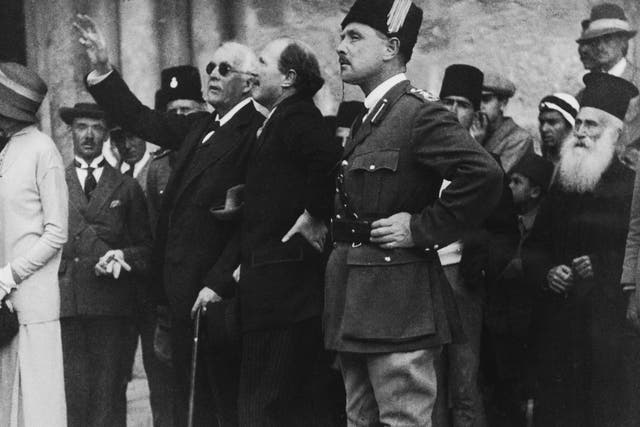

The Balfour Declaration was a letter written by British Foreign Secretary Arthur Balfour to Lionel Walter Rothschild, in which he expressed the British government’s support for a Jewish homeland in Palestine. The long-term effects of the Balfour Declaration, and the British government’s involvement in Palestinian affairs, are felt even today.
Britain’s acknowledgement and support of Zionism, and Zionism’s focus on establishing a Jewish homeland in Palestine, emerged from growing concerns about the direction of World War I.
By mid-1917, Britain and France were mired in a virtual stalemate with Germany on the Western Front, while efforts to defeat Turkey on the Gallipoli Peninsula had failed spectacularly.
On the Eastern Front, the fate of one ally, Russia, was uncertain: The Russian Revolution in March had toppled Czar Nicholas II, and the Russian government was struggling against widespread opposition to the country’s disintegrating war effort against Germany and Austria-Hungary.
Although the United States had just entered the war on the Allied side, a sizable infusion of American troops was not scheduled to arrive on the continent until the following year.
Against this troubling backdrop, the government of Prime Minister David Lloyd George—elected in December 1916—made the decision to publicly support Zionism, a movement led in Britain by Chaim Weizmann, a Russian Jew who had settled in Manchester, England.
The motives behind this decision were various: First, a genuine belief in the righteousness of the Zionist cause was held by Lloyd George and many other influential leaders. Additionally, Britain’s leaders hoped that a formal declaration in favor of Zionism would help gain Jewish support for the Allies in neutral countries, in the United States and especially in Russia, where the anti-Semitic czarist government had just been overthrown with the help of Russia’s Jewish population.
Finally, despite Britain’s earlier agreement with France dividing influence in the region after the presumed defeat of the Ottoman Empire, Lloyd George had come to see British dominance in Palestine—a land bridge between the crucial territories of India and Egypt—as an essential post-war goal.
The establishment of a Zionist state there—under British protection—would accomplish this goal, while also following the Allied aim of self-determination for smaller nations.
Over the course of 1917, however, a vigorous anti-Zionist movement within Parliament held up the progress of the planned declaration.
Led by Edwin Montagu, secretary of state for India and one of the first Jews to serve in the cabinet, the anti-Zionists feared that British-sponsored Zionism would threaten the status of Jews who had settled in various European and American cities and also encourage anti-Semitic violence in the countries battling Britain in the war, especially within the Ottoman Empire.
This opposition was overruled, however, and after soliciting—with varying degrees of success—the approval of France, the United States and Italy (including the Vatican), Lloyd George’s government went ahead with its plan.
On November 2, Balfour sent a letter to Lionel Walter Rothschild—scion of the Rothschild family, a prominent Zionist and a friend of Chaim Weizmann—stating that: “His Majesty’s Government view with favor the establishment in Palestine of a national home for the Jewish people, and will use their best endeavors to facilitate the achievement of this object, it being clearly understood that nothing shall be done which may prejudice the civil and religious rights of existing non-Jewish communities in Palestine, or the rights and political status enjoyed by Jews in any other country.”
By the time the statement was published in British and international newspapers one week later, one of its major objectives had been rendered obsolete: Vladimir Lenin and the Bolsheviks had gained power in Russia, and one of their first actions was to call for an immediate armistice.
Russia was out of the war, and no amount of persuasion from Zionist Jews—who, despite Britain’s belief to the contrary, had relatively little influence in Russia—could reverse the outcome.
The influence of the Balfour Declaration on the course of post-war events was immediate: According to the “mandate” system created by the Treaty of Versailles of 1919, Britain was entrusted with the temporary administration of Palestine, with the understanding that it would work on behalf of both its Jewish and Arab inhabitants.
Many Arabs, in Palestine and elsewhere, were outraged by their failure to receive the nationhood and self-government they had been led to expect in return for their participation in the war against Turkey. In the years after World War I, the Jewish population in Palestine increased dramatically, along with the instances of Jewish-Arab violence.
The area’s instability led Britain to delay making a decision on Palestine’s future. But in the aftermath of World War II and the terrors of the Holocaust, growing international support for Zionism led to the official declaration in 1948 of the nation of Israel.
HISTORY.com works with a wide range of writers and editors to create accurate and informative content. All articles are regularly reviewed and updated by the HISTORY.com team. Articles with the “HISTORY.com Editors” byline have been written or edited by the HISTORY.com editors, including Amanda Onion, Missy Sullivan, Matt Mullen and Christian Zapata.